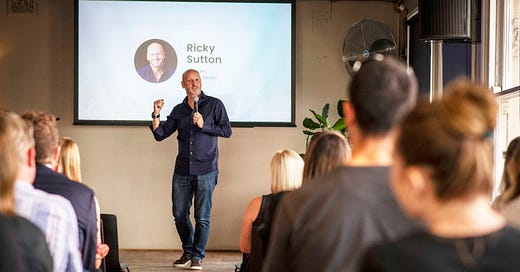No makes us stupid, so let's say yes to friends instead...
#280. I just gave a keynote to publishing and media execs. They all want the same thing. Do it, and everybody wins, but two letters stand in their way...
I’m keynoting an event in steamy Sydney. Man, it’s hot. Shades are blocking the blazing sun outside. The aircon’s cranking 20 to the dozen…
The audience is smart, ambitious. Leaders from news media and from agency land. Cold glasses in hand, they’re ready to par-lay.
They have a shared ambition and a shared problem. They both want to move a few hundred million dollars from digital platforms to publishing.
What could go wrong? Should be a cinch. Clients want it. People want it. Agencies want it. Publishers want it. The world’s a better place if it happens. Let’s go. Right?
Only no. And that’s the problem. That word right there.
No.
It’s small but mighty, and it’s such a stupid word. I hate it. I’ve fought with it my entire career and developed a complex relationship with it.
Knowing it would come up at my keynote, I decided to go introspective and try to understand the psychology of no - and share why it’s time to retire it.
Then explore how a slight change of direction can have a profound impact on billions of people, the economy, and the happiness of the world.
And the story begins on Friday April 13 in 2007. An ominous day for the open web. That’s the day Google bought DoubleClick and unleashed the programmatic era.
It’s burned into my memory.
I was an exec at Fairfax, publisher of The Sydney Morning Herald and The Age, and at the time one of Australia’s largest media companies.
The head of commercial called me to a meeting. I remember the scene like yesterday. We were in a soulless third floor office. Plastic plants in the corner.
And he’s trying to tell me how programmatic is going to save us money.
The sales pitch began: “It will be more efficient. We’ll be able to have less people. It will save us money.
“It’ll enable us to deliver more targeted campaigns. We’ll know exactly where all our advertising goes, and we will be able to make plenty of money. It’s a lifesaver.”
He waved his hands at the unsuspecting sales force outside the glass partition and held his arms wide. “We won’t need most of… this,” he added.
When I asked who’d built this miraculous-magic-money-making-machine, he replied cheerily: “It’s a new Google thing.”
I paused. “OK. well look,” I said, “Every time Google builds something for us, Google seems to get richer, and we get poorer. Why do you think this will be different?”
His response still echoes in my brain today, 18 years later.
“Ricky, at this point,” he said, “any dollar is a good dollar.”
Back to that in a mo, but first, join me in welcoming new subs over the weekend from News Corp in New York (hey there Todd, let’s chat 🤙) the UK’s Professional Publishers’ Association, The Trade Desk, the UK Telegraph (hey Victoria 👋), Southern Cross Austereo, Nine, and the Local and Independent News Association in Australia, Westmount magazine in Canada, my namesakes Future Media in Windhoek, Namibia, Mediaocean in Austin, Texas, the legal privacy team at Deloitte in Luxembourg, and Sonic the Hedgehog’s personal lawyer at Sega Europe in London
We’re now a movement of 4,400 execs and leaders across more than 1,000 news, tech, media and marketing companies servicing more than 4.5 billion people worldwide. Imagine what we can achieve…
And let me know if you’d like me to keynote for you. My rates are here, and you can contact me below.
Right, now let’s go learn something together…
Two decades on, and publishers have less dollars. In fact, all media has damn near no dollars.
Google’s promise of a programmatic paradise hasn’t really worked for publishing, has it?
It’s just accelerated the decline, and all the while Google’s made bank. $350 billion last year, up 14 per cent.
My three decades as an investigative reporter have taught me some stuff.
If one publisher is failing, then that’s likely to be the publisher's fault. Change the boss, pivot a strategy, and voila.
But if an entire global industry is failing, then that’s something else. That’s the end of era, a systemic change - or an industry-wide collapse.
And that’s what this is. An industry failing as one. But that’s a choice, meaning it can change.
Let me explain, because this is what I told the room.
Keep reading with a 7-day free trial
Subscribe to Future Media to keep reading this post and get 7 days of free access to the full post archives.




